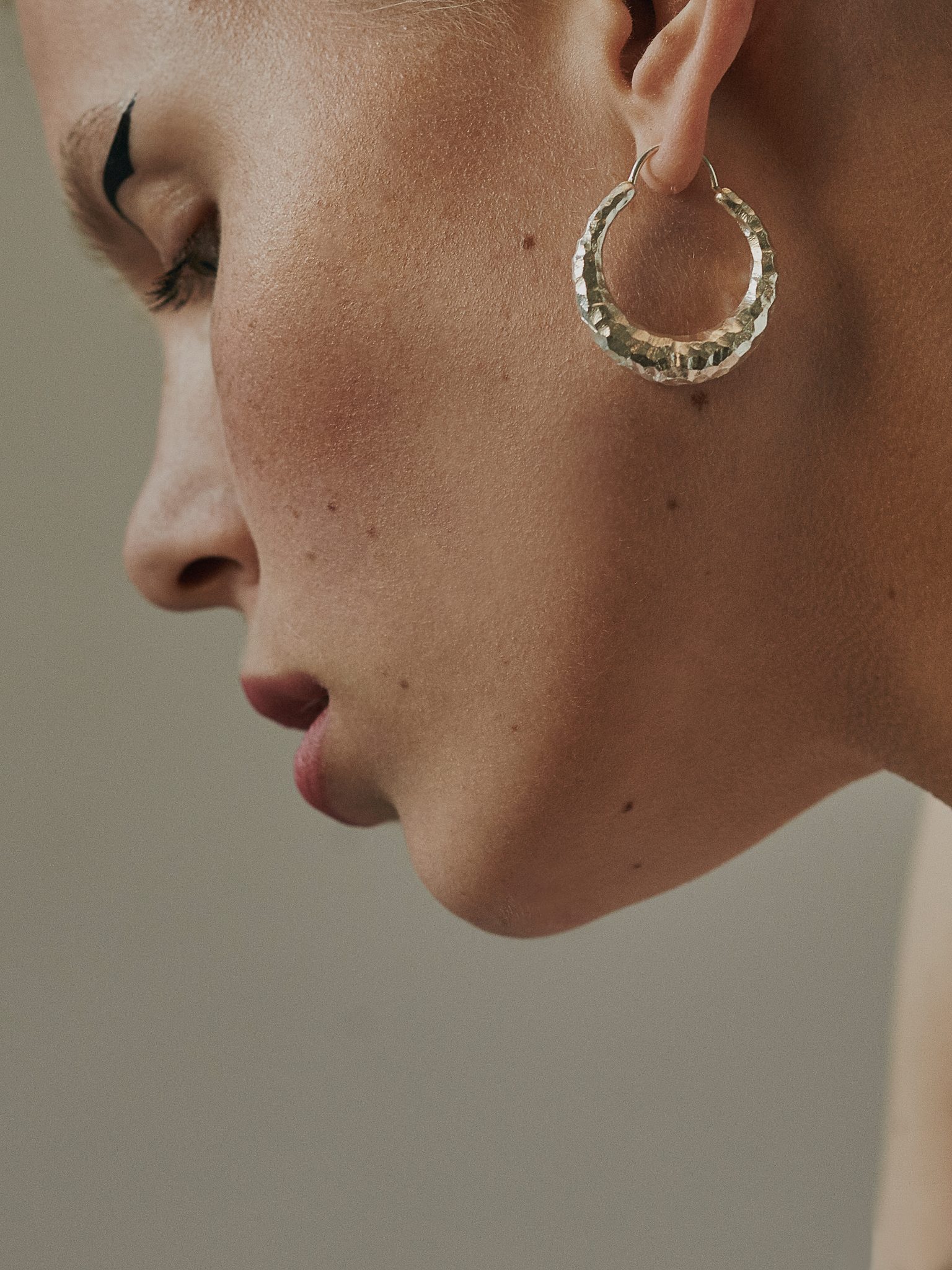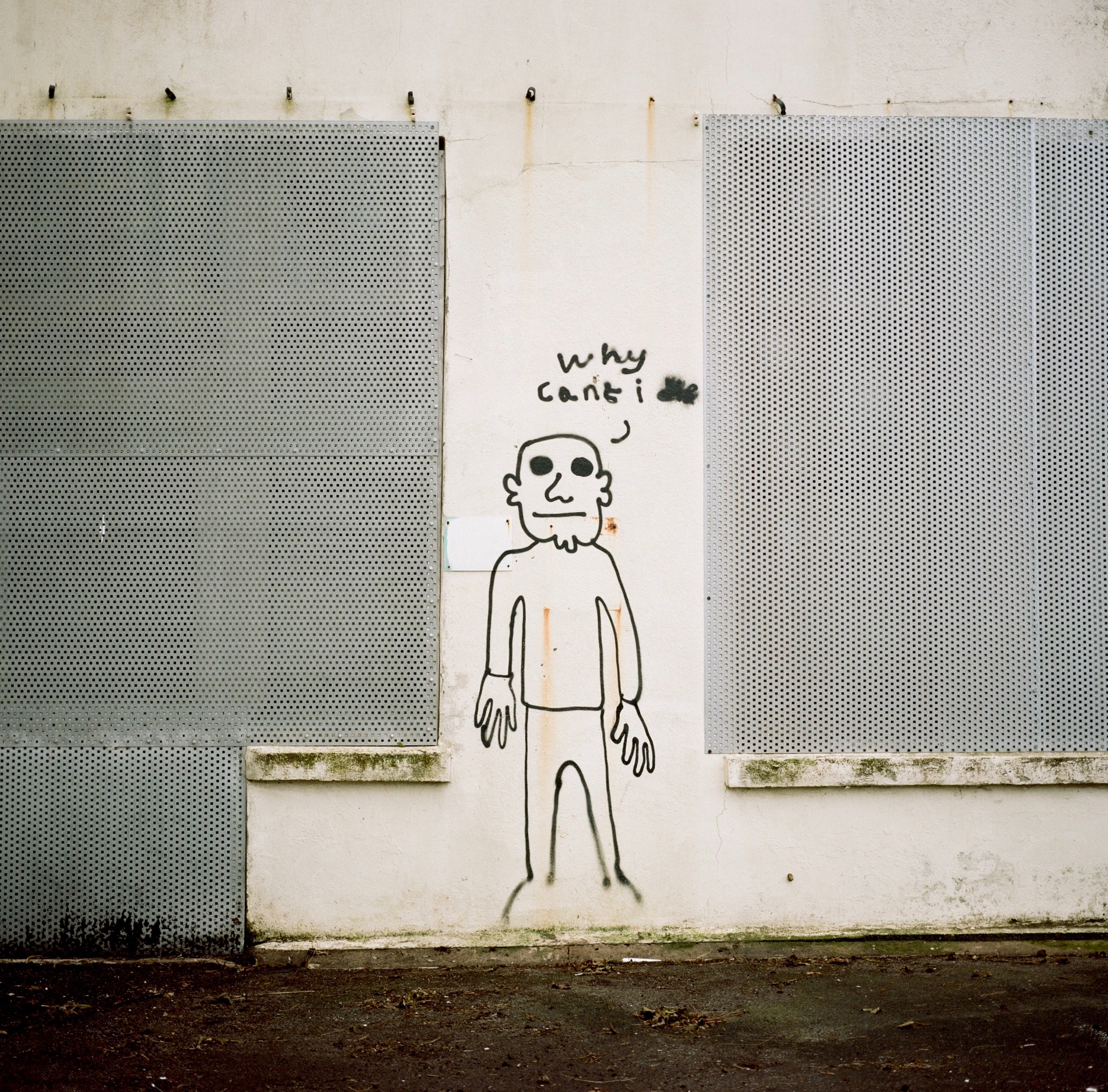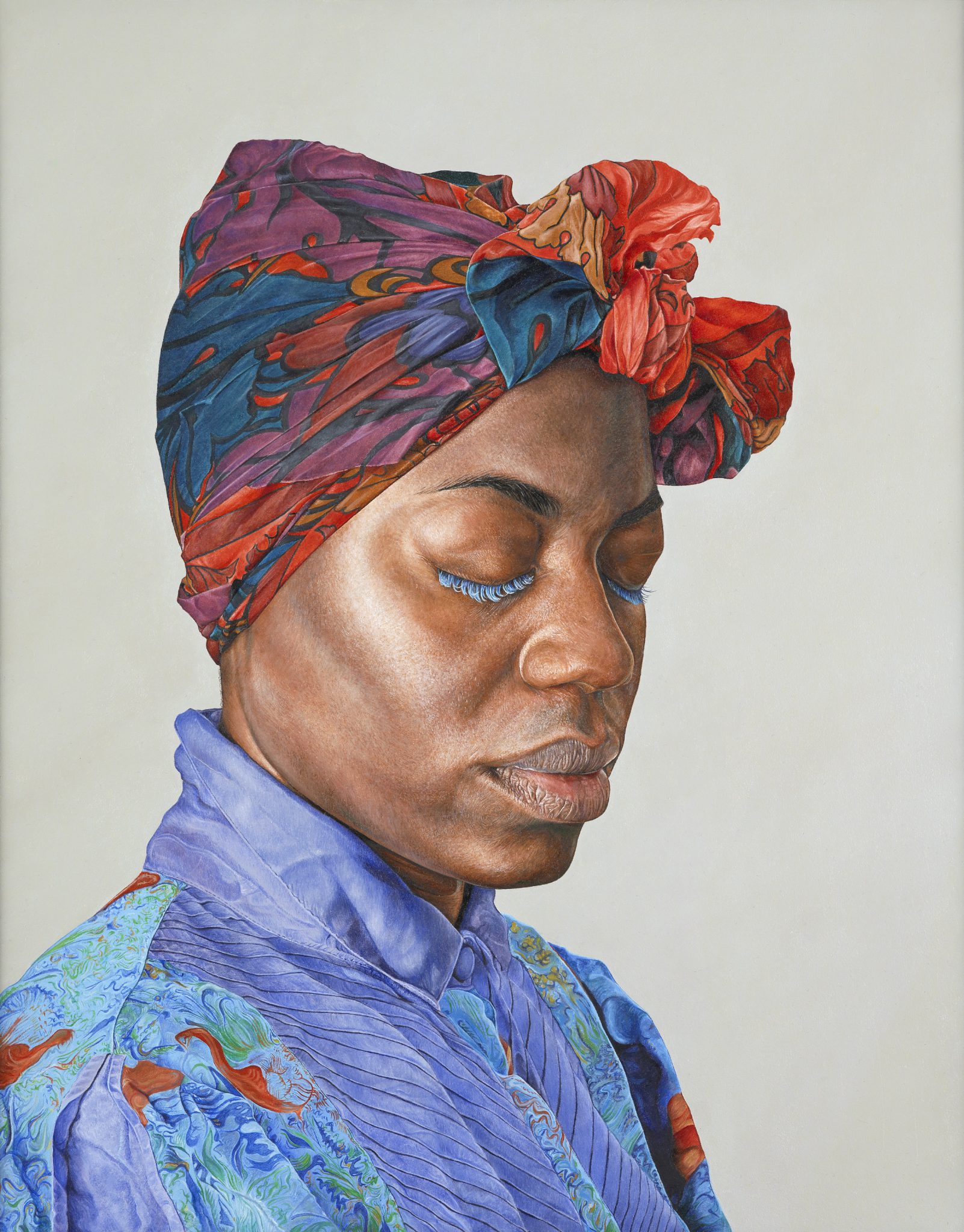

With the photo shoot for this interview all set to get under way, the inevitable discussion is had about what music to put on. Following some gentle prompting from Marika herself, it’s not long before the sounds of Do It Again by Steely Dan are filling the studio, nicely setting the tone. As she will explain to me afterwards, Steely Dan are one of the bands to be heard blaring out in the background on old family home videos, along with the likes of Led Zeppelin, Pink Floyd, Joni Mitchell and Prince, while a considerably younger Marika can be seen jumping around to the music. The household Marika Hackman grew up in was a creative one – her parents were both animators, as well as keen music lovers, and it was them who first introduced her to the joys of playing music, arranging for her and her brother to have piano lessons when Marika was just four. “It gives you such a good understanding, but I really struggled with reading music,” she explains. “I was always told that I had a good ear though; I could learn stuff by hearing it.” By the age of six, Marika was already having a stab at writing her own songs on the piano, persevering with the instrument until her mid teens. It was around that time she learned to play drums and bass guitar, which would prove to be a far more natural fit, not to mention a lot more fun. More serious songwriting efforts soon followed. “I taught myself guitar, got a bunch of songs together and put them online. I had a MySpace page and played the odd gig, but I wasn’t sending demos off to anyone or anything like that. I was doing an art foundation in Brighton but I’d decided not to go to university; by the end of that year, I had publishers and management. It’s a bit random how it all happened.” Random or not, Marika was clearly doing something right. Fellow musician Johnny Flynn, who attended the same school as Marika though not at the same time, had mentioned her to his record label Transgressive and suggested they check her out. “It was at The Shacklewell Arms, which I actually live up the road from now. They came and watched and I was so, so scared; I think I actually threw up the night before. They took me out to the garden and we had a cigarette; they were like ‘Yeah, we want to publish you’. I was like ‘What?!’ I was 19 at that point; that was the kick start really for it being a job, rather than just a hobby.”
Despite things seemingly looking good as far as her career in music was concerned, entry into the realms of being a signed artist brought with it its own problems. As is so often the case with new artists, the music press were keen to pigeonhole Marika straight away, which, in her case, resulted in her being mislabelled. “It was very frustrating. I felt like that whole identity I had as a musician, as an artist, in those first couple of years was just so incongruous with who I am and who I felt I was as an artist. Just being swept into genres that people felt were appropriate without actually delving into the music. I feel like my music spans various genres; it’s genreless even, or it’s doing something new. I felt like it was entirely unfair that I was being put into this kind of twee bracket. One article headline actually used the term ‘twee folk’ to describe my music; I was absolutely horrified. During that part of my career, I was focussed on quite a medieval, macabre sound, talking about rotting flesh, very much drawn to that kind of imagery. I don’t know if I’d been studying Francis Bacon way too much at college or something. It just felt so against how I was being described by the media and I feel like I’ve spent the last five years of my career actively trying to pull myself out of that puddle. I think now, hopefully, I’m out of it; I feel like I am. I feel I’ve established myself as someone who’s shifting with each release and is trying to do stuff that’s different. Hopefully the word twee will never be thrown my way again.”



Along the way, Marika has fostered a number of valuable relationships with other musicians, including fellow singer songwriter Laura Marling, another introduction that came about through word of mouth. Stuart Pearson Wright, an artist friend who was painting Marling’s portrait, brought Marika to her attention and she was invited to join Marling as part of a series of Secret Cinema shows she had coming up. “It was a really nice evening, a really nice experience. I think I shook her hand, went a bit red and got a bit flustered. They added another show and she asked me to come back and play the final show, which was amazing. I went and played it and then kind of stuck around for the wrap party, like a true hanger-on. We ended up chatting properly there and she said ‘You know what, it would be really cool if we could tour together’. Sure enough, the next day I had a WhatsApp from my manager saying ‘Laura wants to take you to Australia’. We spent two weeks in Australia, then followed that up with two weeks in Europe. Particularly in Europe, it was just me, her and Colin – who was tour managing the whole situation – so we went out for lots of drinks, just one-on-one, talked a lot and realised that we were quite like-minded people. She’s just a pal now really.”
Laura Marling also happens to be someone who Marika has previously held up as an all too rare example of a female singer songwriter who is viewed as simply a singer songwriter. In a notoriously patriarchal music industry, it can often be difficult for female artists to escape their gender becoming a marketing tool, not to mention the way women are, or at least historically have been, treated by the industry in general. “It’s a very important thing to be talking about,” says Marika. “It’s frustrating though, because it gets to the point where it shouldn’t be something we’re having to talk about anymore. It just shouldn’t be a thing. I think we’re getting to that point. From my point of view in the industry, yes, there are a lot of men around, but I’ve had pretty good experiences with everyone. It’s not about man-hating or anything like that, it’s just about everyone working together and female artists being taken for what they are, which is musicians. It’s not like an Olympic race where someone is physically bigger than someone else. It’s music; it’s art. We’re all on the same level playing field. It is changing though. I don’t know if I’ve just surrounded myself with a lot of strong, amazingly talented women who are all doing very well, I don’t know if that’s me cherry picking and making myself a bubble, or if that’s just a reflection of the industry at the moment, but certainly from where I’m standing it feels like there’s a shift.”


Following the release of her debut album We Slept At Last in early 2015, Marika set about writing for the follow up, a process that would end up taking longer than expected. Career wise, 2016 would prove tumultuous to say the least, with Marika taking the bold decision to part ways with the management team and record label she had been with for five years. “I felt like it wasn’t working for me,” she explains. “That was a very hard decision to make, very upsetting. It felt like a breakup. There was a lot of emotional turmoil around that time. Once that shift had happened though and I was a free agent, I think it really opened me up creatively. I felt really brave, because it was a brave move, and I felt very empowered, after coming out of feeling very weird and low and confused about everything. That’s when the ball really started rolling with the writing. I had maybe three or four of the songs that have ended up on the record at that point, but I think the real punch of the record, the songs that really give it the bite, they all happened after that. I think that was really reflective of me just having this new creative wind and just going with it. We started recording it pretty soon as well. I was so raring to go, I really wanted to get everything recorded, I really wanted to get it done, then there was this huge blip in the middle and it felt like I could have just caused my downfall and added a whole year to the situation, but actually we got going pretty quickly. The songs started flowing and we started bringing it together.” The result is I’m Not Your Man, an album of spiky, overtly personal guitar-led tunes brimming with energy that sits in distinct contrast to the previous release, a shift which Marika acknowledges as being intentional. “I’ve been doing this for around six years now and I’ve grown up a lot; there’s a big difference between a 19 year old and a 25 year old and I feel I understand myself more. I also feel that I better understand the artist I am and I’ve been able to separate the two a bit more and think about what it is I want to say when I’m writing music and who this artist is, who she is and how she is in the world. I think because I’ve created almost like a persona for myself, it’s allowed me to be more direct, whereas before I was a bit scared. It’s more tongue in cheek, more sarcastic, it’s just more fun and straight up. I think before, because I felt so attached to my artistic identity as though we were one, I was quite scared to be so direct, so I would shroud things in metaphor. I’m saying a lot of the same stuff as on the first record, it was just all hidden behind trees.”


Lead track Boyfriend is a prime example of this shift in tone, an infectious four minutes run through with an undeniable charm that belies the twisted tale being told. For Marika, it was this track that signalled a significant turning point for the album, despite it coming fairly late on. “I don’t know where the fuck those lyrics came from; they just came out of nowhere. I always start with the first line. The first lyric I get is always the first line and I take it from there. That just popped into my head, probably just fit with the melody I’d come up with, and I kind of just went with it, twisted it all on its head and it kind of just flew out. I remember thinking ‘Oh, this is happening now. I’ve done this. I’ve written this.’ I was supposed to be going to meet some friends for a drink and I’d had the riff to Boyfriend for ages, I had the chorus harmony in there, but I didn’t have any lyrics, no melody and I didn’t have any verses. In the afternoon, I’d stolen a chord progression from a song I’d written when I was 18, which I put in as the verse. About six o’clock, I just cancelled on my friends; I was like ‘I’m not coming, I’ve just really got to finish this song’, and it just happened that evening. I’m glad I stayed in. It was really exciting, like, ‘Where’s this come from?’ I don’t fucking know, but I’m going to roll with it’. Then recording it, having The Big Moon girls in and having this real fun group experience doing it live, you can hear all of the noises and shit, people kicking on pedal boards and stuff like that, people shouting. The whole thing was really fun.”
Since a young age, despite having come so far and firmly established herself as a musician in her own right and on her own terms, Marika has often been beset with anxiety. Much to her credit, she has always remained very open about the issue. “I think talking about it is incredibly important. I don’t know anyone in this industry, or pretty much anyone my age, who doesn’t have some kind of anxiety problem. I’ve kind of got on top of mine; I’ve learnt over the last few years how to deal with that. I was an anxious child before I started being a musician, having panic attacks when I was 17. It is one of those things, the more you understand that other people deal with the same thing, it really takes the sting out of it. If I think back to when I was a kid and I had my first panic attack, I thought I was dying. I thought I was the only person in the world who’d experienced it, that it would never get better and I’d be stuck with it. Hearing other people and finding out they have gone through exactly the same thing and are absolutely fine, you learn coping mechanisms and you can deal with it. I think that’s the most important way of getting over it. From 17 to around 22, I would keep pushing myself; I would never say no to anything because of anxiety. I wanted to prove to it that I could do anything anyway, that it wouldn’t matter. I did my driving test in the middle of a full-on panic attack, but I passed it. So it was like, one point to me, zero to anxiety. I thought ‘Well, I still did that when I was feeling like shit, so what else can I do?’ It makes it smaller and smaller and less scary.”
Along with trusting your instincts, pushing yourself remains an important mantra for Marika. “I always think it’s so boring when artists don’t push themselves. What are you doing if you’re just making the same thing over and over again? What’s the point in that? If you’re not making something that doesn’t already exist, you might just as well be ripping off someone else. I always want to be pushing myself. I got quite scared just before going into the studio for this album; I’d never recorded like that before, recording it live and rehearsals and stuff, even the subject matter in a sense I found quite intimidating, even though it had come out of me. I ended up having so much fun doing it though. The lesson is, fear is a good thing. It’ll push you to go outside your comfort zone. That’s what pushes you into something new and exciting, not just staying in a safe little box.”
‘I’m Not Your Man’ is released on 2nd June and can be pre-ordered here.
Words: Philip Goodfellow
Artist: Marika Hackman @Universal Music
Photographer: Daniel Sachon
Stylist: Indigo Goss
Hair and Make up: Crystabel Riley @Stella Creative Artists using Weleda and Boucleme
Stylist Assistant: Alexsi Jay



